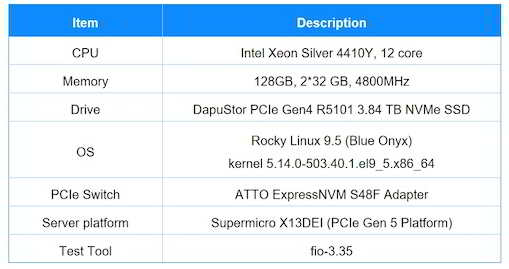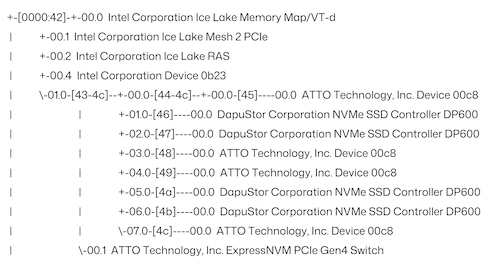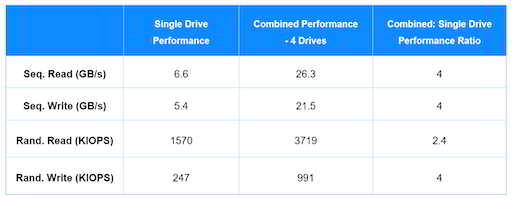DapuStor Partners ATTO for Scalable NVMe Storage with Advanced PCIe Switch Technology
System with 1xATTO ExpressNVM S48F NVMe Switch Adapter and 4xNVMe DapuStor SSDs was tested for compatibility and performance
This is a Press Release edited by StorageNewsletter.com on November 20, 2025 at 2:01 pmATTO Technology, Inc. and DapuStor Corp. have partnered to deliver a high-performance NVMe solution that boosts overall system efficiency.![]() Non-Volatile Memory Express (NVMe) is a storage protocol purpose-built for SSDs connected via PCIe. NVMe SSDs offer significantly lower latency in the 10 microseconds and deliver GB/s of sustained RW throughput. A PCIe Switch can enable PCIe bifurcation, adding more PCIe lanes to the motherboard, so that more NVMe SSDs can be accommodated on the host with little performance overhead.
Non-Volatile Memory Express (NVMe) is a storage protocol purpose-built for SSDs connected via PCIe. NVMe SSDs offer significantly lower latency in the 10 microseconds and deliver GB/s of sustained RW throughput. A PCIe Switch can enable PCIe bifurcation, adding more PCIe lanes to the motherboard, so that more NVMe SSDs can be accommodated on the host with little performance overhead.
Expanded PCIe Connectivity:
- Scale NVMe storage beyond native CPU PCIe lane limitations through integrated PCIe switching
- Connect and manage more NVMe SSDs/host while maintaining full bandwidth and lowlatency access
- FPGA-based control intelligently orchestrates host-target device paths, optimizing efficiency and resource allocation in real-time
Optimized Throughput:
- Aggregate multiple PCIe lanes and balance traffic dynamically across NVMe devices for sustained throughput
- Reduce contention and eliminate oversubscription by ensuring each SSD receives adequate bandwidth
- Delivers multi-drive performance scaling that matches CPU-native NVMe without latency penalties
Integration:
- Appears as standard NVMe device to the host OS – no proprietary drivers or software layers required
- Compatible with industry-standard RAID implementations both software-based and hardware RAID engines for high-availability configurations
- Works within existing PCIe, NVMe, and UEFI frameworks, simplifying qualification and deployment
Intelligent Host and Target Management:
- FPGA logic on-board handles link initialization, path management, and error recovery independent of host CPU resources
- Enables multi-host sharing and drive pooling with deterministic latency and isolation between workloads
- Supports adaptive performance tuning and real-time monitoring of device health
Infrastructure and Power Efficiency:
- Reduces reliance on additional CPU sockets, chipsets, and memory channels by consolidating NVMe connectivity into a single adapter
- Lowers total power draw/TB of NVMe capacity by minimizing idle CPU and memory overhead
- Cuts rack-level power and cooling requirements, improving density and energy efficiency for high-performance environments
Test Results
A system with 1x ATTO ExpressNVM S48F NVMe Switch Adapter and 4 x NVMe SSDs (DapuStor PCIe Gen4 R5101 3.84TB) was tested for compatibility and performance. The hardware, OS, and test tools are illustrated below.
The topology of the connection between the PCIe card and drives can be found from the lspci command.
The NVMe SSD drives can also be found using from NVMe list command.
The combined performance of 4XNVMe SSDs, which are linked to an ATTO ExpressNVM S48F adapter, and the performance of a single drive are both tested. We then calculate the ratio between the combined and the single drive performance to show how much the PCIe card is resistant to the link overhead.
This test result demonstrates the capability of the joint solution to connect and manage multiple DapuStor NVMe SSDs via ExpressNVM S48F adapter while minimizing the overhead on performance.
Solution Use Cases
Potential target applications for the solution include:
- High-Performance Storage Arrays
Build dense NVMe all-flash arrays by connecting multiple DapuStor NVMe SSDs behind an ATTO ExpressNVM adapter for maximizing performance and capacity - Accelerate Data Processing and Analytics
Deliver multi-million IOs and extremely high throughput for applications such as OLTP databases, real-time analytics, AI-inferencing, and cloud-native storage workloads. - Content Delivery, Rich-Media Editing and Streaming
Ideal for video-on-demand (VOD), OTT platforms, and edge CDN nodes requiring consistent low latency and high throughput - Transactional Databases and Financial Systems
Optimized for MySQL, PostgreSQL, and Oracle – supporting high-frequency trading and real-time risk analysis














 Subscribe to our free daily newsletter
Subscribe to our free daily newsletter

